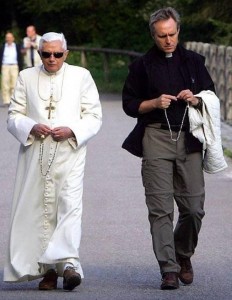Vatican City, 9 May 2012 (VIS) – “From the first moment of my election as Successor of St. Peter I have always felt supported by the prayers of the Church, by your prayers, especially at moments of greatest difficultly, and I thank you from the bottom of my heart”, said Benedict XVI today during his general audience. “Constant choral prayer is also an important way to overcome any trials that may arise on life’s journey, because it is by being profoundly united to God that we can also be profoundly united to others”.
As part of a series of catecheses dedicated to the early Church, this morning the Holy Father focused his remarks on the last episode of St. Peter’s life recounted in the Acts of the Apostles, when he was imprisoned by Herod Agrippa then freed by an angel of the Lord.
The Pope reminded the 10,000 faithful gathered in St. Peter’s Square that, while the Apostle was in prison, the Church prayed for him constantly. Thus, the Holy Father explained, “the power of the Church’s incessant prayer rose up to God; the Lord listened and sent His angel to ensure the Apostle was freed by an inconceivable and unexpected act of liberation”.
The Pope then turned to consider Peter’s actions while in prison, and the fact that he was sleeping which the angel came. “In such a critical and dangerous situation, this may seem strange, but it actually denotes tranquillity and trust”, he said. “Peter trusted in God, he knew he was surrounded by the solidarity and support of his followers and so abandoned himself entirely into the hands of the Lord. This is how our prayer must be: assiduous, united with others, an expression of complete trust in God Who knows us in our most intimate selves and looks after us”.
Once free, Peter went to the house of Mark’s mother where many disciples were gathered in prayer. As in other episodes in the Acts of the Apostles, so also on this occasion “the response of the community to difficulties and peril was to entrust themselves to God, to intensify their relationship with Him”, Pope Benedict said. In this context he also dwelt on another moment of difficult faced by the early Church, motivated by envy and disputes within the community. According to St. James, who recounts the episode, there were two reasons for the crisis: the fact that people allowed themselves to be dominated by their passions, especially selfishness, and the lack of prayer. That situation will change, the Apostle says, if the entire community prays together, assiduously and cohesively. This recommendation, the Pope explained, is “also an important call for us and for our communities, both small communities such as the family, and larger communities such as the parish, the diocese and the Church as a whole”.
The liberation of St. Peter, the Holy Father concluded, “tells us that the Church, and each one of us, must suffer difficulties, but the incessant vigilance of prayer supports us. … With constant and trusting prayer the Lord frees us from our chains and guides us. … He gives us serenity of heart to face the difficulties of life, even rejection, opposition and persecution. … The Apostle Peter, though in chains, was calm and certain that he was not alone: the community was praying for him, the Lord was close. He knew that ‘the power of Christ is fully expressed in weakness'”.

